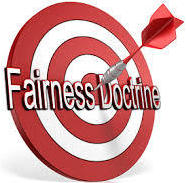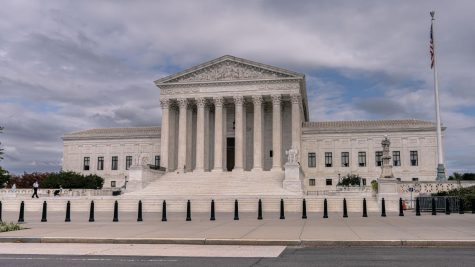The Fairness Doctrine: To Be or Not to Be Fair and Balanced
The airwaves belong to the public. It is the duty of the Federal Communications Commission (FCC) to regulate broadcasting stations to ensure that any use of public airwaves serves public interests.
News broadcasters are obliged: 1) to ensure the public receives news on issues of public importance, and 2) to accord fair amounts of time for listeners to hear opposing views on issues during newscasts.
In 1949 the FCC solidified the two rules by implementing the Fairness Doctrine. For 38 years and prior, the Fairness Doctrine was the law of the land. However, on August 4, 1987, the FCC abolished the doctrine, ultimately concluding that the Fairness Doctrine was not fair–to broadcasters.

With the Fairness Doctrine, the FCC firmly established the duty of Broadcasters to report on matters of public importance and in a fair and balanced way. Broadcasters had to act reasonably and in good faith to present a fair presentation of issues and political candidates.
But Broadcasters never much liked the Fairness Doctrine.
Two basic problems arose—how to find a balance between public interest and freedom of speech, and how to regulate the public airwaves without violating free speech.
In 1969, Red Lion Broadcasting v. FCC case, the U.S. Supreme Court upheld the Fairness Doctrine, but all the warning signs existed then, that the law was in trouble.
In arguing against the Fairness Doctrine in 1974, the New York Times argues that “fairness should be left … to Broadcasters.” The Times also wrote that it was dangerous to allow “a government agency the power to judge a news organization’s performance…” Broadcasters should be accountable to viewers, not government rules, it argued.
According to the Broadcast companies, public confidence, watchfulness, and competition are true judges of fairness, and they should be the only tools for judging fairness.
By 1985, the FCC released a report stating the rules were unconstitutional and not enforceable as such. Congress attempted to fix the rules, but none of the ideas gained bipartisan support.
On August 4, 1987, the FCC abolished the Fairness Doctrine. Portions of the rules remained intact for a time, but the U.S. Court of Appeals ruled in 2000 that the remaining rules could not be enforced since the Fairness Doctrine had been eliminated.

As if in passing, in a three-sentence update to readers on October 8, 2000, the New York Times announced that the federal government had suspended two old regulations, calling them “the last major vestiges of the Fairness Doctrine.”
While Broadcasters were happy to see the rules eliminated, not everyone was so thrilled. The public voices that wanted to keep the Fairness Doctrine were useless, muted by the onslaught of corporate resistance to the rules.
Some make the argument that eliminating the Fairness Doctrine was the single largest contributor to the divided America we face today. Media deregulation at every turn and the rise of internet blogs and online news, according to some, set the stage for and allowed false and derogatory news and talk-radio broadcasts.
In a 2011 PBS Travis Smiley blog by Tamika Thompson, Ms. Thompson asks the question, are we better off without the Fairness Doctrine? Has the American Media landscape suffered for it?
Thompson listed a lengthy quote from Robert F. Kennedy, Jr. Kennedy makes a passionate argument in support of a Fairness Doctrine.
Left to their own devices, says Kennedy, Broadcasters are not accountable to viewers. They are accountable to shareholders. Those shareholders have no boundaries, no oversight, nothing to ensure the public interests are protected.
Kennedy points out to readers that Canada has a Fairness Doctrine that works just fine, as does England.
Our citizenry does not have those protections anymore. Without all and accurate information, citizens are not able to make informed choices.
To make matters worse, Republican leaders have been targeting Net Neutrality using the same arguments used against the Fairness Doctrine—free speech, First Amendment, fairness; but fairness to whom?
Republican House Representative Marsha Blackburn stated in 2009, that Net Neutrality is the “fairness doctrine for the Internet.” Even back then, the bulls-eye was set on Net Neutrality.
Most people cannot even imagine the Internet without Net Neutrality rules. However, the more media corporations conglomerate, the harder it becomes to regulate them.
No rules at all regarding fairness and protecting the public’s interest hardly seems rational, but that is the question before lawmakers. What do the people who own the airwaves have to say about it?













